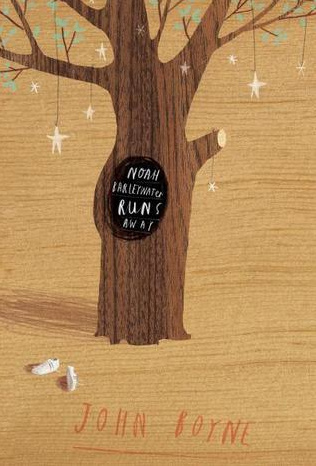

“The first thing he noticed was how quiet it was. This was nothing like the kind of quiet he heard when he woke up in the middle of the night after a bad dream. When that happened, there were always strange, unidentifiable sounds seeping into his room from the tiny gaps where the windowpanes weren't sealed together correctly. At those moments he could always tell there was life outside, even if all that life was fast asleep. It was a silence that wasn't silence at all.”
― John Boyne, quote from Noah Barleywater Runs Away
“Do you think . . . ?"
'I do sometimes, my boy,'admitted the old man. 'When I can't avoid it.”
― John Boyne, quote from Noah Barleywater Runs Away
“I like 'fresh fruit flan'," said the donkey. "Three excellent words."
"I don't have one," said Noah immediately before the question could even be asked, and the donkey opened his eyes wide in suprise, and for a moment Noah wondered whether he might even consider eating him.”
― John Boyne, quote from Noah Barleywater Runs Away
“These were colours he'd never ever seen before; ones he couldn't possibly begin to name. Here, to his left, was a wooden clock, and it was painted, well not exactly green, but a colour that green might like to be if it had any imagination at all. And over there, beside the wooden board game whose overriding colour was not red, but something that red might look at enviously, blushing with embarrassment at its own dull appearance. And the wooden letter sets, well, there were those who might have said that they were painted yellow and blue, but they would have said this knowing that such plain words were an outrageous insult to the colouring on the letters themselves.”
― John Boyne, quote from Noah Barleywater Runs Away
“Here's a tip though', he told me, leaning over and pressing a hand into my shoulder. 'If you want to improve your time, run faster.”
― John Boyne, quote from Noah Barleywater Runs Away

“It was important to look confident, he realized that very early on. After all, there was a terrible tendency among adults to look at children travelling alone as if they were planning a crime of some sort. None of them ever thought that it might just be a young chap on his way to see the world and have a great adventure. They were so small minded, grown-ups. That was one of their many problems.”
― John Boyne, quote from Noah Barleywater Runs Away
“A swelled head is just a result of nature's frenzied efforts to fill a vacuum.”
― Dean Koontz, quote from Phantoms
“when I look in your eyes, one word leaps into my mind every single time: Forever.”
― Lara Adrian, quote from Veil of Midnight
“Everytime you do a Good Deed with true intention, your soul grows purer.”
― Soman Chainani, quote from The School for Good and Evil
“I wanted to stay locked away from the pain and destruction. I didn't want to be strong. I didn't want to be the 'smart girl'. I was so very tired. I just wanted it all to be over.”
― Ruta Sepetys, quote from Salt to the Sea
“just . . . I don’t like crying girls, okay?” We were quiet for a second while I took that in. “That was very nice of you, David,” I finally said. “Now hold on because I’m about to drive into a fence.”
― Rachel Hawkins, quote from Rebel Belle
BookQuoters is a community of passionate readers who enjoy sharing the most meaningful, memorable and interesting quotes from great books. As the world communicates more and more via texts, memes and sound bytes, short but profound quotes from books have become more relevant and important. For some of us a quote becomes a mantra, a goal or a philosophy by which we live. For all of us, quotes are a great way to remember a book and to carry with us the author’s best ideas.
We thoughtfully gather quotes from our favorite books, both classic and current, and choose the ones that are most thought-provoking. Each quote represents a book that is interesting, well written and has potential to enhance the reader’s life. We also accept submissions from our visitors and will select the quotes we feel are most appealing to the BookQuoters community.
Founded in 2023, BookQuoters has quickly become a large and vibrant community of people who share an affinity for books. Books are seen by some as a throwback to a previous world; conversely, gleaning the main ideas of a book via a quote or a quick summary is typical of the Information Age but is a habit disdained by some diehard readers. We feel that we have the best of both worlds at BookQuoters; we read books cover-to-cover but offer you some of the highlights. We hope you’ll join us.